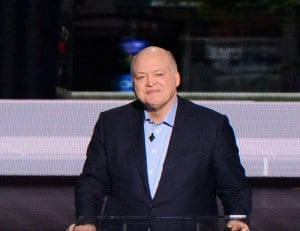
Ford CEO Jim Hackett said he “could not be prouder” of the company’s employees after a better-than-expected second quarter..
Automaker after automaker has lined up and reported second quarter losses in the past several days, except Tesla — and now Ford Motor Co., sort of.
Ford turned a Q2 profit, reporting $1.1 billion in net income on revenue of $19.4 billion. However, if you take out a $3.5 billion gain from its investment in autonomous vehicle developer Argo AI, the automaker posted an adjusted EBIT loss during the quarter.
The adjusted EBIT result was $3 billion better than expected. The company post a $900 million net loss on revenue of $53.7 billion for the first half of the year
(VW, Ford U.S. EVs endangered due to ongoing legal battle between battery suppliers.)
“I could not be prouder of the Ford team’s optimism and effectiveness as we manage through this pandemic,” said President and CEO Jim Hackett in a statement. “We delivered a strong Q2 while keeping each other safe, caring for customers and neighbors, and assuring tomorrow.”
The company is an island of good news in a sea of tough results due to the global pandemic. Ford said it repaid $7.7 billion of an outstanding $15.4 billion on its revolving credit facilities, and also extended $4.8 billion of its three-year revolving credit lines. The company ended the quarter with more than $39 billion in cash, some of that due to the draw down from the credit lines.
The company’s almost $40 billion in liquidity today is expected to be sufficient to maintain or exceed a target cash balance of $20 billion through the second half of this year, even if global demand declines or there is another major wave of pandemic-related plant closures.
“Our global team is delivering great value for customers, performing strongly and advancing the business against extraordinary headwinds,” said Ford CFO Tim Stone. “You’re seeing us fix things that held us back in the past, accelerate in areas like commercial vehicles and SUVs, and set ourselves up for growth in connectivity, electrification and autonomous vehicles.”
(Ford follows lead of other Detroit makers with Q2 sales results.)
The quarter also saw Ford finalize several partnerships with Volkswagen. The alliance emphasizes innovation and choice for their respective customers of commercial vehicles and high-performing EVs, including:
- A medium pickup truck engineered and built by Ford
- A city delivery van developed and made by Volkswagen Commercial Vehicles and a
- 1-tonne cargo van created by Ford, and
- A highly differentiated Ford EV for Europe based on Volkswagen’s Modular Electric Drive, or MEB, toolkit.
Volkswagen also completed its investment in Argo AI. Ford and VW will work with Argo AI to independently develop autonomous vehicles at scale based on Argo AI’s innovative self-driving system.
In the meantime, CFO Stone said Ford’s expectations for the second half of the “assume no meaningful change in the current economic conditions, continued steady improvement in stability of the global automotive supply base, and no further significant coronavirus-related disruptions to production or distribution.”
(Ford sales dropped in 2019 despite strong truck results.)
The company predicted third-quarter adjusted EBIT of $0.5 billion to $1.5 billion, reflecting economic effects of the pandemic; year-over-year weaker global demand for new vehicles, parts and services; and a lower profit from Ford Credit than a year ago.
